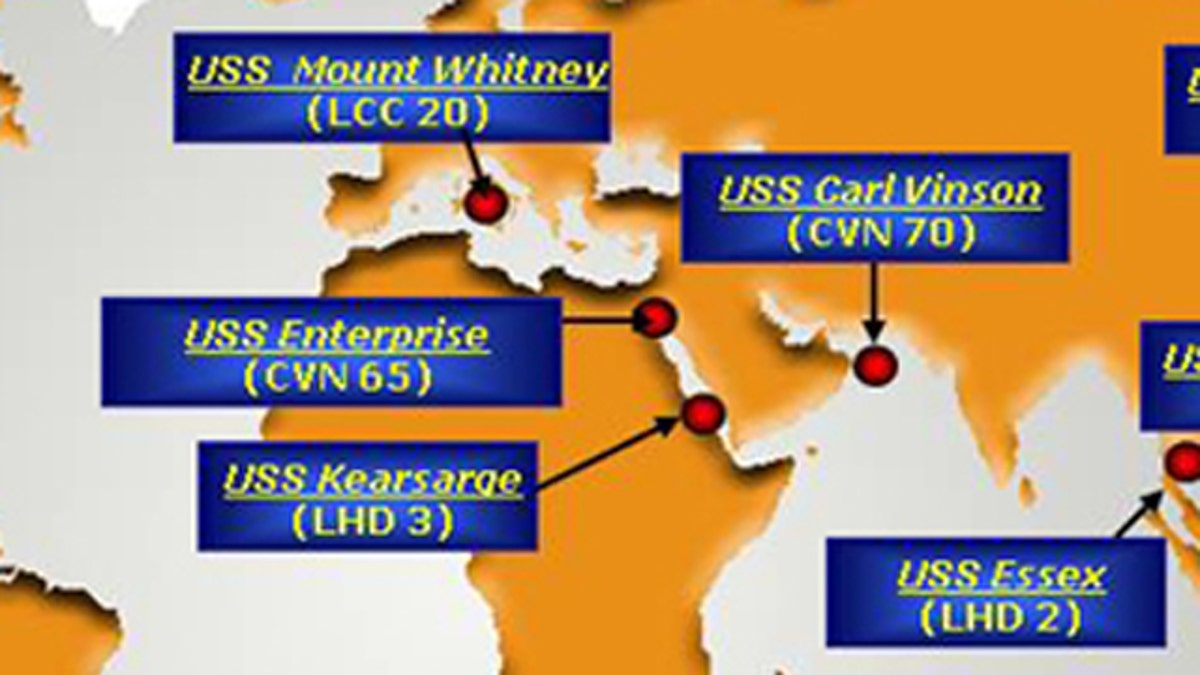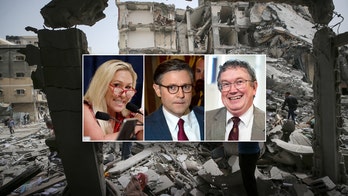
Shown here are the positions of key U.S. Navy ships on Feb. 28. (www.chinfo.navy.mil)
Libyan dictator Muammar al-Qaddafi's forces attacked rebels in two cities Monday in the face of international condemnation of his crackdown on the uprising, as the U.S. military began repositioning its forces near North Africa.
The United States and its allies have imposed sanctions on Libya and are considering whether to establish a no-fly zone over the country, where a resistance army is building against Qaddafi. His loyalists on Monday fought rebels holding the two cities closest to the capital, and his warplanes bombed an ammunition depot in the east
At the same time, U.S. officials have toughened their rhetoric against Qaddafi in the last few days as they call for him to step down. Susan Rice, U.S. ambassador to the United Nations, on Monday called Qaddafi "delusional" and accused him of "slaughtering his own people."
As the administration weighs its options, Fox News has learned that the aircraft carrier USS Enterprise -- which was previously positioned off the coast of Somalia, where it was stationed to respond to a pirate hijacking -- has turned around and moved to the mouth of the Suez Canal in the Red Sea. It is now heading in the direction of Libya -- with 15 detained pirates on board.
Pentagon spokesman Col. Dave Lapan said the military is "repositioning" forces to be ready to assist in Libya. Most likely, U.S. forces would be asked to provide humanitarian relief, though no decision has been made and the State Department has not yet made a request to the military, Lapan said.
A senior U.S. military official told Fox News that the Enterprise has not yet been ordered to move through the Suez Canal into the Mediterranean Sea, describing the aircraft carrier as one "option" available to the military as the situation in Libya develops.
"We are exploring all options and moving assets in case they are needed," the official said.
Another military official told Fox News that the military is trying to figure out where to find a battalion of Marines to attach to the Marine Expeditionary Unit on board the USS Kearsarge, which has plans to move north through the Suez canal into the Mediterranean Sea sometime in the near future. The unit's land troops are currently being used in Afghanistan, but the unit could be in a position to help a humanitarian effort in Libya if other ground troops are assigned from elsewhere. Two other U.S. warships already are stationed in the Mediterranean.
Meanwhile, the Treasury Department announced Monday that at least $30 billion in Libyan government assets have been frozen. The U.S. Agency for International Development also devoted "an initial" $10 million for humanitarian assistance in Libya.
As international pressure builds for Qaddafi to step down and end the violence in his country, a military official told Fox News a no-fly zone over Libya is "seriously under consideration."
A no-fly zone would require NATO support, and Lapan said no decision has yet been made on whether to impose one.
A senior Obama administration official also downplayed an article Monday in The New York Times that detailed behind-the-scenes talks among U.S., European and NATO officials about the possibility of flight restrictions over Libya. But the official acknowledged the scenario was being discussed.
"This is no different than what's been said repeatedly at briefings. It's an idea that is on the table and under consideration," the official said.
Secretary of State Hillary Clinton was in Geneva Monday to press European allies to take action against Libya. After the Obama administration announced unilateral sanctions against Libya Friday, the U.N. Security Council approved its own sanctions Saturday followed by the European Union on Monday.
Clinton said as far as allied action is concerned, "nothing is off the table so long as the Libyan government continues to threaten and kill Libyan citizens."
One European Union official reportedly said negotiations were being conducted over the possibility of a no-fly zone.
The direction the Libyan uprising takes next could depend on which side can hold out longest. Qaddafi is dug in in Tripoli and nearby cities, backed by his elite security forces and militiamen who are generally better armed than the military. His opponents, holding the east and much of the country's oil infrastructure, also control pockets in western Libya near Tripoli. They are backed by mutinous army units, but those forces appear to have limited supplies of ammunition and weapons.
Qaddafi opponents have moved to consolidate their hold in the east, centered on Benghazi -- Libya's second- largest city, where the uprising began. Politicians there on Sunday set up their first leadership council to manage day-to-day affairs, taking a step toward forming what could be an alternative to Qaddafi's regime.
The opposition is backed by numerous units of the military in the east that joined the uprising, and they hold several bases and Benghazi's airport. But so far, the units do not appear to have melded into a unified fighting force. Qaddafi long kept the military weak, fearing a challenge to his rule, so many units are plagued by shortages of supplies and ammunition.
On Monday, pro-Qaddafi forces retook control of the western border crossings with Tunisia that had fallen under opposition control and they bombed an ammunition depot in the rebel-held east, residents in the area said. The Libyan Defense Ministry denied the bombing.
Regime forces also moved to tighten their ring around two opposition-controlled cities closest to the capital Tripoli -- Zawiya and Misrata -- where the two sides are locked in standoffs.
Fox News' Jennifer Griffin, Justin Fishel and Mike Emanuel and The Associated Press contributed to this report.




